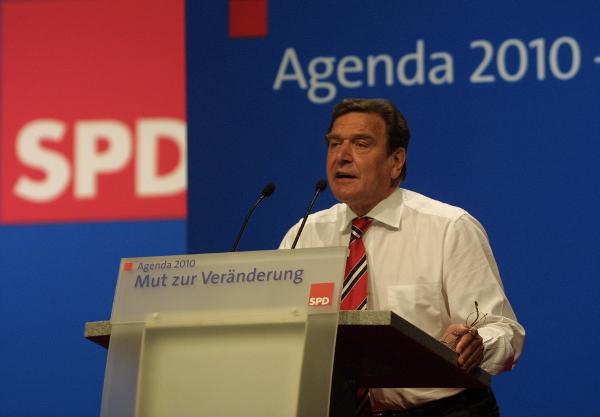Source

Source: (c) picture-alliance / Sven Simon
Chancellor Gerhard Schröder’s first term in office (1998-2002) was about “governing with a calm hand.” After the 2002 Bundestag elections, however, he changed course. In an address entitled “Courage for Peace and Courage for Change,” which Schröder delivered to the Bundestag on March 14, 2003, he announced: “We will be cutting state benefits, promoting individual responsibility, and demanding that every individual make greater efforts.” Through the implementation of a comprehensive reform program called “Agenda 2010,” Schröder hoped to restructure the social welfare system and improve conditions for economic growth and employment. The proposed trimming of the social safety net provoked severe opposition within his own party (SPD), however. The party’s left wing criticized the planned measures as an attempt to “dismantle the social welfare state.” In the face of these internal quarrels, Schröder – who had been appointed SPD party chair after Oskar Lafontaine's resignation in 1999 – and SPD Secretary General Olaf Scholz held a series of regional conferences in April/May 2003 to convince the SPD’s rank and file to support the Agenda policies. On June 1, 2003, the SPD held a special party conference on the reforms in Berlin, and the Agenda 2010 motion passed with 80 percent of the vote. Before the conference, Schröder had pinned his own personal political fate to Agenda 2010, promising to resign if it failed to garner support. Despite this success, the party continued to debate the pace and scale of the reforms. Ultimately, the lack of political support for his policies – made clear by the SPD’s disastrous performance in the 2005 regional elections and by the rejection of both Agenda 2010 and Hartz IV by the SPD’s left wing – prompted Schröder to call for early elections.

Source: (c) picture-alliance / Sven Simon